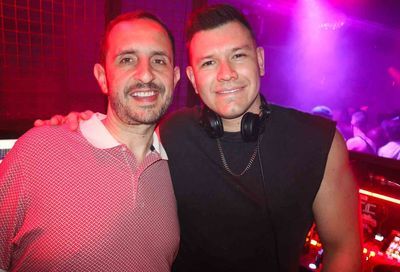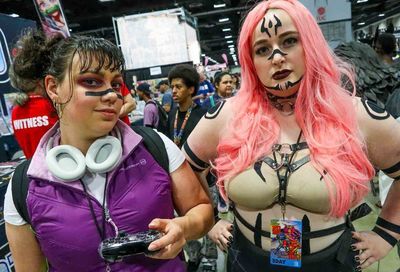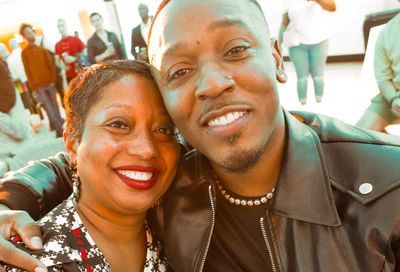‘Daisy Jones and The Six’ Review: Band Camp
'Daisy Jones and The Six' doesn't reach the heights of the legends it's trying to replicate, but it does strap you in for the ride.

Taylor Jenkins Reid’s novels have been on bestseller lists for years, making adaptations inevitable, but Daisy Jones and The Six (★★★☆☆) is the kind of story made for the screen.
A tale of a band making it big, and then quitting right as they peaked, Daisy Jones is not untrodden ground. It feels very comfortable in the same atmosphere that made movies like Almost Famous and A Star is Born sing (pun intended), but proves it’s worthy of being more than a one-hit wonder, flaws and all.
Inspired by Fleetwood Mac’s journey to stardom, Daisy Jones starts us down two paths, the first with Graham (Will Harrison) and Billy Dunne (Sam Claflin), who end up forming the basis of the band in Pittsburgh. Meanwhile, Daisy Jones (Riley Keough) forgoes her rich and mean parents in favor of making music, despite most people in her life telling her to not even try.
Through the Dunne Brothers, we meet the rest of the band and get an idea of what’s to come in the series, setting up Billy on the road to addiction and fatherhood with his girlfriend Camilla (Camilla Morrone). The band fits standard archetypes, with aloof drummer druggie Warren (Sebastian Chacon), continuously fucked over bassist Eddie (Josh Waterhouse), cool English girl keyboarder Karen (Suki Waterhouse), and Graham, who lives in his brother’s shadow.

Meanwhile on the west coast, Daisy has become fast friends with Simone Jackson (Nabiyah Be), who would become a disco legend in The Six‘s universe, and encourages Jones to pursue her own career in music. Soon, Daisy finds a new fan in Teddy Price (Tom Wright), a producer looking for the next big musical act and ends up becoming the bridge for Daisy Jones to meet The Six.
Before they can rule the world, they have to get anyone to listen to their music. After becoming a hit at Pittsburgh’s finest proms and weddings, The Six set off to L.A. to figure out who they are. The narrative’s weaknesses begin to sprout around this time, with things becoming a little too coincidental, as the band suddenly has a recurring gig on the L.A. strip, convinces Waterhouse’s Karen to leave her life behind and come join their band after one phone call, and just happen to run into their dream producer at the corner store.
As things ramp up, Daisy Jones has a hard time shaking the polish and safety that weighs it down. The main plot is set up very early, and instead of surprising you, does exactly what you expect.
Presented with documentary-style interviews and clips from the future, we quickly come to understand what Daisy Jones is all about. By the end of the first episode alone, you’ll begin thinking about some of the other great films and show about musicians, which is where the familiarities become impossible to ignore.
The “present-day” documentary interview portions don’t feel necessary and they spoil some of the fun to come. These present-day voices also illustrate some of the show’s dialogue problems, which sound too contrived in the present day, while sounding too modern in the ’60s and ’70s portions of the series.

Daisy Jones is a safe show, never really daring to go beyond previous conventions. The consistency helps keep you entertained, but also inhibits the story from shining early on. For the most part, the consistency trends upward, with the show getting better as the introductions get pushed aside, especially after Keough and Claflin’s characters finally get in the same room. The parts of the show that do work aren’t uncommon, but the bulk of what happens, especially early on, feels like it’s happening because it’s supposed to, not because it actually would. Once you suspend your disbelief and give in, there is a lot of fun to be had, even if it doesn’t reach the heights of others in its genre.
The most compelling parts of Daisy Jones are its characters. Claflin and Keough quietly yet forcefully hold down the show, but it’s Morrone and Be who really bring their characters down to Earth. Morrone as Claflin’s lover is by far the first standout of the show, with her scenes bringing the same energy as Gaga in A Star is Born, enamored with someone on the verge of a downfall. Be’s Jackson provides the show some agency, with her career being firmly outside the main band, while getting to show the better sides of Daisy Jones as a friend and caring person.
Tom Wright also does amazing work bridging the show’s two main forces, while providing more depth to the story when it needs it most. The cast ends up meshing well, holding down the show despite the worst ensemble of wigs on any characters in any show over the past decade.
The music at the core of Daisy Jones isn’t going to top the charts á la “Shallow.” To be fair, it is kind of impossible to truly capture the magic of something that has captivated our world, in this case Fleetwood Mac. The comparisons never really leave your mind, making it harder to buy the music Daisy Jones is trying to sell.
Without the music soaring, it forces the rest of the story to pick things up, further bogging it down. The musician side of things highlights what feels like that little something that is missing that made projects like Almost Famous all-time classics. Claflin and Keough fulfill their roles as the troubled band leads, with the latter having the forceful coolness that made her grandfather, Elvis Presley, an enigmatic figure, but something is still missing.
Ultimately, the safety of Daisy Jones doesn’t sour everything. The series is incredibly watchable, having just enough sparks and soap opera turns to keep you happy. If you loved the book, it may not live up to your expectations, but if you find the songs it plays worth listening to, then you’ll be content.
New episodes of Daisy Jones and The Six release weekly on Thursdays on Prime Video. There are ten episodes in all. Visit www.amazon.com.
Support Metro Weekly’s Journalism
These are challenging times for news organizations. And yet it’s crucial we stay active and provide vital resources and information to both our local readers and the world. So won’t you please take a moment and consider supporting Metro Weekly with a membership? For as little as $5 a month, you can help ensure Metro Weekly magazine and MetroWeekly.com remain free, viable resources as we provide the best, most diverse, culturally-resonant LGBTQ coverage in both the D.C. region and around the world. Memberships come with exclusive perks and discounts, your own personal digital delivery of each week’s magazine (and an archive), access to our Member's Lounge when it launches this fall, and exclusive members-only items like Metro Weekly Membership Mugs and Tote Bags! Check out all our membership levels here and please join us today!





















You must be logged in to post a comment.